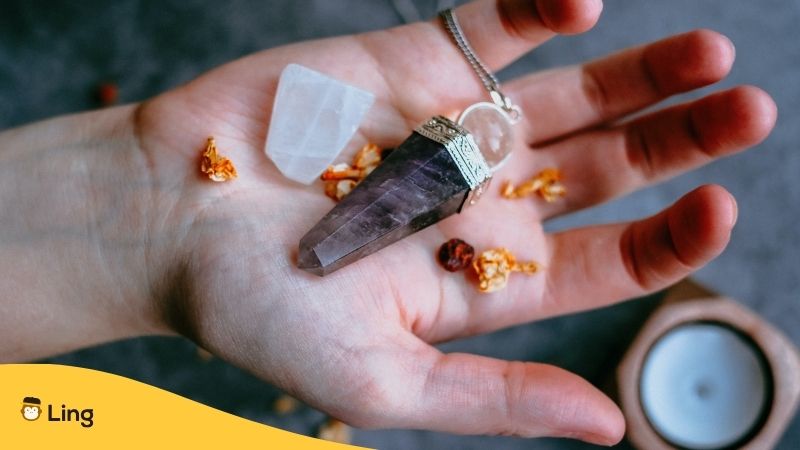Magic, a captivating art that transcends time and culture, has always fascinated humanity with its mystical allure. So, is it really a wonder that the Cantonese words for magic are as mysterious as the mesmerizing calligraphy that describes them?
Cantonese, a Chinese dialect rich in history and tradition, offers a fascinating collection of words that unveil a myriad of magical concepts. In this linguistic exploration, we’ll embark on a journey to discover the origin of 10 Cantonese words that evoke the enchantment of the magical realm.
The Essence Of Magic In Language
Language serves as a window into the cultural psyche, reflecting how societies perceive and interact with the world around them. The Cantonese language is no exception, offering a glimpse into the vibrant world of magic through its lexicon. While many of these terms may not have direct English counterparts, they hold within them a wealth of cultural significance and an entire universe of magical thought.

1. Magic – 魔術 (Mo1 Seot6)
At the heart of it all lies the word for “magic” itself – 魔術 (mo1 seot6). The characters break down into “魔” (mo1), which refers to demons or supernatural entities, and “術” (seot6), denoting a skill or technique. Together, they encapsulate the mystical craft of manipulating supernatural forces. The term implies a deep respect for the power and intricacy of magic, echoing the awe and reverence with which magic has been regarded throughout history.
2. Witchcraft – 巫術 (Wu1 Seot6)
In the realm of magical practices, the term 巫術 (wu1 seot6) delves into the world of witchcraft. “巫” (wu1) signifies a shaman or sorcerer, one who bridges the gap between the mortal and the divine. This word highlights the connection between humans and the mystical, emphasizing the role of individuals who possess the knowledge and ability to wield magic for both benevolent and malevolent black magic purposes.
3. Incantation – 咒語 (Zau3 Jyu5)
At the heart of many magical practices are incantations, or 咒語 (zau3 jyu5). “咒” (zau3) refers to a spell or a curse, while “語” (jyu5) means words or language. The combination of these characters captures the essence of spoken magic, where words hold the power to manifest change in the physical or spiritual realm.
4. Talisman – 符咒 (Fu1 Zau3)
Talismans, objects believed to possess magical properties, are described as 符咒 (fu1 zau3) in Cantonese. “符” (fu1) denotes a charm or symbol, while “咒” (zau3) once again underscores the connection to spells and incantations. Chinese talismans are more than mere objects; they are conduits of magical energy, often inscribed with protective symbols, translations, or words to harness their supernatural capabilities.
5. Divination – 占卜 (Zim1 Buk1)
Divination, the art of seeking hidden knowledge or glimpses into the future, is encapsulated in the term 占卜 (zim1 buk1). “占” (zim1) refers to taking an omen or sign, while “卜” (buk1) is associated with the act of divining through various methods such as casting lots or reading oracle bones.

6. Fantasy – 幻想 (Waan6 Soeng2)
The world of magic often intertwines with realms of imagination and fantasy, beautifully captured by the term 幻想 (waan6 soeng2). “幻” (waan6) signifies illusion or fantasy, while “想” (soeng2) conveys the notion of thought or imagination. This adjective illustrates the role of magic in transcending the boundaries of reality and inviting individuals to explore and be aware of fantastical landscapes where anything is possible.
7. Illusion – 鏡花水月 (Geng3 Faa1 Seoi2 Jyut6)
Delving into the nature of illusion, the term 鏡花水月 (geng3 faa1 seoi2 jyut6) paints a vivid picture of ephemeral beauty and fleeting moments. “鏡” (geng3) refers to a mirror, “花” (faa1) is a flower, “水” (seoi2) represents water, and “月” (jyut6) symbolizes the moon. Together, these characters evoke the concept of illusory images reflected in a mirror, as transient as flowers in water or the moon’s reflection.
8. Charm – 魅力 (Mei6 Lik6)
Charm, both in the sense of personal allure and magical enchantment, finds its expression in the term 魅力 (mei6 lik6). “魅” (mei6) signifies fascination or allure, while “力” (lik6) represents power. This term underscores the captivating influence that magic holds over hearts and minds, highlighting its ability to enthral and captivate individuals through its mystique.
9. Inspiration – 靈感 (Ling4 Gam2)
The concept of inspiration, often intertwined with the mystical, is beautifully encapsulated in the term 靈感 (ling4 gam2). “靈” (ling4) conveys the notion of spirit or soul, while “感” (gam2) denotes feeling or perception. Together, they evoke the idea of a spiritual or supernatural influence that sparks creative thought and artistic expression.
10. Mystery – 神秘 (San4 Bei6)
Finally, the term 神秘 (san4 bei6) encapsulates the very essence of the magical realm – mystery. “神” (san4) signifies the divine or spiritual, while “秘” (bei6) denotes secrecy or hiddenness. This term emphasizes the enigmatic nature of magic, portraying it as a realm that beckons with promises of hidden knowledge and truths that lie beyond the grasp of ordinary understanding.
A Few More Mystical Cantonese Words For Magic
Learn More Magical Cantonese With Ling
Learning Cantonese can sometimes feel like learning a magical new language with a script imbued with mysticism. With Ling, you will be invited into a Hogwarts of lessons, games and quizzes that keep your Chinese language learning exciting and enchanting. Click on Google Play or the App Store to release the wizardry!



































































